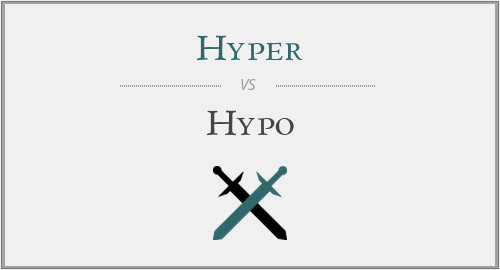Hyper vs. Hypo: Navigating Prefixes in Language
In the realm of language and medical terminology, the prefixes "hyper-" and "hypo-" are used to convey opposite meanings, but their subtle differences can sometimes lead to confusion. This article aims to clarify the distinctions between "hyper" and "hypo," shedding light on their meanings, applications, and appropriate usage in various contexts.
Correct Usage:
Hyper:
The prefix "hyper-" is used to indicate excessive or above normal levels of a particular quality or condition. It implies an overactive or heightened state and is often used in medical terms, such as "hypertension" (high blood pressure) or "hyperactivity" (excessive activity).
Hypo:
Conversely, the prefix "hypo-" is used to indicate deficient or below normal levels of a particular quality or condition. It implies an underactive or diminished state and is also prevalent in medical terminology, such as "hypothyroidism" (underactive thyroid) or "hypoglycemia" (low blood sugar).
Meanings and Applications:
Hyper:
Use "hyper-" when describing a state of excess, abundance, or heightened activity. This prefix is applicable in various fields, including medicine, science, and everyday language, to convey an elevated level of a particular quality or condition.
Hypo:
Use "hypo-" when describing a state of deficiency, insufficiency, or lowered activity. Similar to "hyper-," this prefix is widely utilized in medical and scientific contexts to indicate a below-normal level of a specific quality or condition.

Examples:
Correct: The patient was diagnosed with hyperthyroidism, indicating an overactive thyroid gland.
Correct: The experiment showed hypothermia symptoms, signifying a condition of abnormally low body temperature.
Precautions:
Be mindful of the context and the specific meaning you want to convey when using these prefixes. Misunderstanding the distinction between "hyper-" and "hypo-" can lead to confusion regarding the direction of excess or deficiency.
Conclusion:
Navigating the prefixes "hyper-" and "hypo-" enriches language and enhances precision in communication, especially in medical and scientific contexts. Whether discussing elevated or diminished states, understanding the meanings of these prefixes contributes to effective expression and clarity.




Have a discussion about this article with the community:
Report Comment
We're doing our best to make sure our content is useful, accurate and safe.
If by any chance you spot an inappropriate comment while navigating through our website please use this form to let us know, and we'll take care of it shortly.
Attachment
You need to be logged in to favorite.
Log In